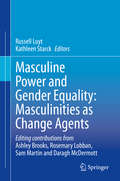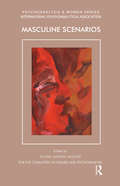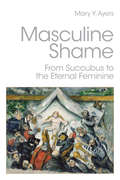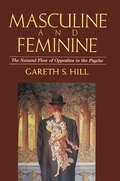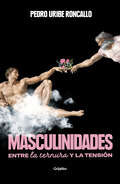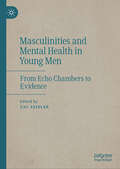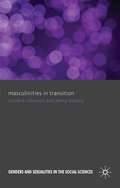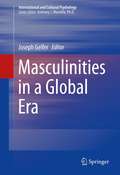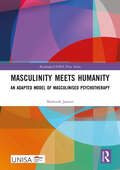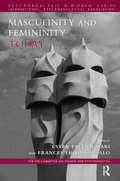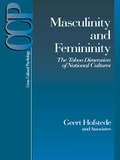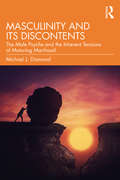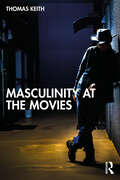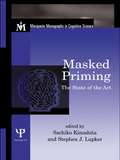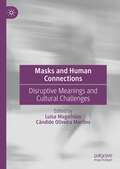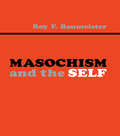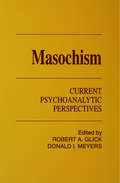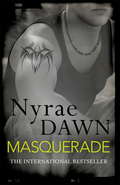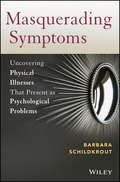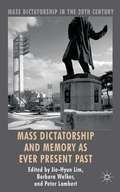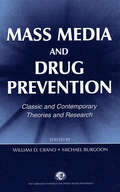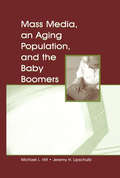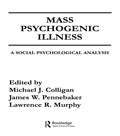- Table View
- List View
Masculine Power and Gender Equality: Masculinities As Change Agents
by Russell Luyt Kathleen StarckThis book explores how political institutions can challenge dominant and normative masculinities, guiding thinking instead toward a transformation of gendered power structures and general equality. Representing a range of relevant areas, the expert chapter authors provide various methodological and theoretical approaches applied to shifting gender meanings in cultural, national, and social contexts. Authors also represent a variety of cultures, contributing to the multi-perspective debate about how best to achieve gender equality in the real world.Among the topics discussed:Reimagining masculinities, their everyday practice and practical interventions Towards a feminist theory of male rapePolitical implications of challenging men’s everyday practices through domestic violence primary prevention workMen as allies: a case study of White Ribbon AustraliaMasculine Power and Gender Equality: Masculinities as Change Agents provides valuable insight into strategies for re-imagining male-dominated power structures and promoting gender equality.
Masculine Scenarios (Psychoanalysis and Women Series)
by Mariam Alizade'Human identity, sexual identity, primary and secondary identification, object choice, narcissism - all of these lie on a continuum with homosexuality, transsexualism, transvestism, heterosexuality and asexuality. Concepts on sexuality and gender are outlined anew in an interplay of theoretical and clinical networks, with the aim of increasing the efficiency of analytic praxis freed from prejudice and monolithic convention.'- the author, from the Foreword Masculine Scenarios is the third volume in a unique series edited by the author for the Committee on Women and Psychoanalysis of the International Psychoanalytical Association. Providing a forum for exploration and discussion of diverse issues relating to gender constructs, sexuality, and sexual identity, the series brings together an internationally renowned group of contributors trained in the psychoanalytic tradition. Masculine Scenarios concentrates on issues regarding the psychic world of men and male sexuality. The construction of gender identity, the battle of the sexes, transsexualism, homosexuality and masculinity are some of the topics discussed in this inspiring book.
Masculine Shame: From Succubus to the Eternal Feminine (Routledge Studies In Religion Ser.)
by Mary Y. AyersHow does the image of the succubus relate to psychoanalytic thought? Masculine Shame: From Succubus to the Eternal Feminine explores the idea that the image of the succubus, a demonic female creature said to emasculate men and murder mothers and infants, has been created out of the masculine projection of shame and looks at how the transformation of this image can be traced through Western history, mythology, and Judeo-Christian literature. Divided into three parts areas of discussion include: the birth of civilization and the evolution of the succubus the image of the succubus in the writings of Freud and Jung the succubus as child killing mother to the restoration of the eternal feminine. Through a process of detailed cultural and social analysis, the author places the image of the succubus at the very heart of psychoanalytic thought, highlighting its presence in both Freud’s Medusa and Jung’s visions of Salome. As such, this book will be of great interest to all those in the fields of analytical psychotherapy and psychoanalysis.
Masculine and Feminine: The Natural Flow of Opposites in the Psyche
by Gareth S. HillA Jungian analyst provides a new model for understanding the masculine and feminine principles that exist in everyone, providing insight into the events of daily life and the themes of entire lifetimes.
Masculinidades
by Pedro UribeUn lúcido ensayo sobre las masculinidades, el rol de los hombres en la sociedad compleja de hoy y las distintas visiones que existen sobre la virilidad, el patriarcado y la deconstrucción de lo masculino. En tiempos en que el feminismo parece tomarse el debate, el sicólogo Pedro Uribe escribe sobre las luces y las sombras que están atravesando las relaciones entre los hombres y las mujeres en una sociedad compleja y turbulenta como la actual. Y se pregunta: ¿qué está pasando con los hombres?, ¿por qué algunos son violentos y otros, criados del mismo modo, no ejercen violencia de género?, ¿por qué los hombres actúan así? ¿qué están sintiendo? Desvelando el manto de misterio que cubre la masculinidad, esta es una invitación a pensar y ampliar las miradas sobre el rol de los varones en la sociedad de hoy.
Masculinities and Mental Health in Young Men: From Echo Chambers to Evidence
by Zac SeidlerThis book seeks to understand young men’s mental health by going to the places and spaces where they spend their time. It is essential reading for researchers, clinicians, policymakers and members of the general public who care about men’s wellbeing. Each chapter focuses on the contemporary nexus between masculinities and health, encompassing alcohol, gambling, sport, gaming, social media, pornography, and dating apps, to explore how and why these areas are central to young men’s lives and their health. Addressing the present day ‘crisis of masculinity’, this edited volume comprises a series of up-to-date reviews to emphasise strength-based, healthy masculinities in young men’s mental health. It seeks to understand and engage with research, policy, and practice to co-design effective interventions supporting young men, presenting a clear agenda to direct future efforts.
Masculinities in Transition
by Victoria Robinson Jenny HockeyContributing to feminist approaches to masculinities, this book examines men's contextual experiences of masculine identity. Drawing on new data which compares men as they move across and between public and domestic spaces, it explores the implications of this for the nature of contemporary masculinity.
Masculinities in a Global Era
by Joseph GelferMasculinities in a Global Era extends the conversation of masculinity studies by analyzing global masculinities from a psychological perspective. Canvassing a broad array of psychological aspects such as the construction of identity, the negotiation of power, coping with trauma, and sexuality, this volume shows how masculinities are experienced, performed and embodied in geographically dispersed communities. Importantly, Masculinities in a Global Era fulfills a much-needed but elusive need within the study of masculinities: a forum in which the often polarized approaches of pro-feminists and men's rights advocates can begin to move beyond their entrenched historical positions towards a more fruitful and nuanced future.
Masculinity Meets Humanity: An Adapted Model of Masculinised Psychotherapy (Routledge/UNISA Press Series)
by Shahieda JansenIn this book the author, a clinical psychologist, reflects on her psychotherapy experiences with male clients as she debunks the myth of male alexithymia, the inability to recognise and express emotions. Men are apparently disengaged from wellness practices as they are perceived to be reluctant to seek mental health care. An ubuntu-inspired personhood discourse of trust, empathy and transformation theoretically underpins the author’s clinical practice. The integration of the culturally familiar philosophy of ubuntu challenges the hegemony of strictly modern Western psychological discourses and theories. Although the book is not a manual for how to do therapy with men, neither a panacea for all male related challenges, it can ignite empathic insights and kindle gender sensitive responses to male concerns, locally and internationally. Women, who are frequently the targets of gender-based violence primarily committed by men, may play a significant role in the rehabilitation and healing of men. Men are usually excluded from psychosocial interventions, but this book makes the case that prioritsing the wellbeing of boys and men is critical to creating a society that is safe for everyone—men, women, children, and the broader public. Print editions not for sale in Sub-Saharan Africa.
Masculinity and Femininity Today (Psychoanalysis and Women Series)
by Frances Thomson-Salo Ester Palerm MaríThis book presents a wide range of psychoanalytic writing on masculinity and femininity from British, European, and North and South American perspectives, exploring how masculine and feminine aspects are structured and evolve in the child, adolescent and adult. The authors address from a background of considerable clinical experience how masculinity and femininity manifest in the body, gender, sex, sexuality and the life-cycle, and cover aspects both productive and generative, constricted and defended. The importance of the parenting couple and their bond with the child in the forming of masculine and feminine idenitities is emphasized. Beginning with an overview of the development of masculinity, the developmental perspective is explored in how adolescents discover their sexuality and come to 'own' their sexual bodies. Different types of disturbance are explored including the early defence mechanism of disavowal of difference.
Masculinity and Femininity: The Taboo Dimension of National Cultures (Cross Cultural Psychology)
by Geert HofstedeIn 1980, Geert Hofstede published his monumental work CultureÆs Consequences, which laid out four dimensions on which the differences among national cultures could be understood: individualism, power distance, uncertainty avoidance, and masculinity. Since then much research has been conducted and presented on individualism/collectivism but until now, no single volume has focused on the masculinity dimension of the model. In Masculinity and Femininity, Hofstede has expanded, sharpened, and deepened the discussion of masculinity and femininity. This new volume presents the first thoroughly developed discussion of this dimension and how it can help us understand the differences among cultures. It begins with a general explanation of masculinity and discusses how it illuminates broad features of different cultures. It then applies the dimension more specifically to gender, sexuality, and religion. Finally, the book examines how the masculinity dimension reveals a lot about a cultureÆs expressions of religious ideas, the importance its citizens attach to religion, and the way religious concepts are understood. Intended as a companion volume to KimÆs Individualism and Collectivism, this important volume will be of interest to those teaching courses such as cross-cultural psychology, international social welfare, international business, womenÆs studies, cultural studies, and the psychology of women.
Masculinity and Its Discontents: The Male Psyche and the Inherent Tensions of Maturing Manhood
by Michael J. DiamondOffering a uniquely psychoanalytic developmental perspective on male gender identity and the sense of maleness, this book provides an in-depth analysis of the development of masculinity in childhood and its continued evolution throughout a man’s life. Drawing on classical Freudian theory, as well as on more contemporary psychoanalytic theories, this book explores early infancy and child development, preoedipal factors and the oedipal complex, the influence of parenting and the unconscious transmission of gendered factors both by mothers and both biological and symbolic fathers, the male ego ideal, social, cultural, and biological influences, the role of inherent psychic bi-genderality in the context of gender binaries, and the inherent gendered tensions and challenges experienced as an individual progresses into adult and later life. This book is original in its characterization of the male developmental trajectory as underpinned by psychoanalytic principles pertaining to conflict and inherent tensions that continue throughout the life cycle and strongly impact other areas of life. Deeply rooted in the unconscious, a man’s multiply determined sense of masculinity requires deconstructing the mother, the feminine, and the other in the male psyche. As the text illustrates via clinical vignettes, an awareness and an understanding of these areas can improve the clinical work of psychoanalysts working with men who struggle with the intrinsic conflicts in their sense of maleness. This book will be of great clinical value to psychoanalysts, psychotherapists and other mental health practitioners, and will stimulate the thinking of scholars in such areas as gender theory, psychodynamic and sociocultural aspects of gender roles, and the changing social definition of masculinity.
Masculinity at the Movies
by Thomas KeithMasculinity at the Movies takes a deep dive into masculinity in film and how Hollywood movies continue to produce and promote masculine stereotypes that place boys and men in constraining identities and dysfunctional patterns of behaviour.From classic film stars to those of the present day, this textbook unpacks the development of the main male stereotypes in film – villains, heroes, and oafs – and how movies can develop healthy new male representations. Alongside Hollywood studio productions, it delves into Black, Native American, Latino, and Asian representation as well as LGBTQ masculinity. Going beyond the present, it proposes what healthy masculinity at the movies looks like and where Hollywood should set its sights to create more progressive models of masculinity for the 21st century.Masculinity at the Movies will provide students of gender studies, media studies, and cultural studies with new insights into stereotypes of men in contemporary film.
Masked Priming: The State of the Art (Macquarie Monographs in Cognitive Science)
by Sachiko Kinoshita Stephen J. LupkerMasked priming has a short and somewhat controversial history. When used as a tool to study whether semantic processing can occur in the absence of conscious awareness, considerable debate followed, mainly about whether masked priming truly tapped unconscious processes. For research into other components of visual word processing, however - in particular, orthographic, phonological, and morphological - a general consensus about the evidence provided by masked priming results has emerged. This book contains thirteen original chapters in which these three components of visual word processing are examined using the masked priming procedure. The chapters showcase the advantages of masked priming as an alternative to more standard methods of studying language processing that require comparisons of matched items. Based on a recent conference, this book offers up-to-date research findings, and would be valuable to researchers and students of word recognition, psycholinguistics, or reading.
Masks and Human Connections: Disruptive Meanings and Cultural Challenges
by Luísa Magalhães Cândido Oliveira MartinsThis interdisciplinary collection explores four distinct perspectives about the mask, as object of use for protection, identity, and disguise. In part I, contributors address human identities within collective social performance, with chapters on performativity and the far right and masked identities in political resistance and communication. Part II focuses on the mask as a signifying object with strong representational challenges, exploring representations in festivals, literature, and film. Part III investigates the ambiguous use of the mask as a protective and concealing element, delving into visual culture and digital social media contexts. Finally, Part VI draws on the work of Levinas and Deleuze to investigate a philosophical view of the mask that addresses memory and ethics within intersubjective relationships. Questioning the contemporary world, using communication, sociology, visual culture, and philosophical theory, the volume provides a pedagogical and formative perspective on the mask.
Masochism and the Self
by Roy F. BaumeisterThis volume provides an integrative theory firmly grounded in current psychology of the self, and offers a fresh, compelling account of one of psychology's most enigmatic behavior patterns. Professor Baumeister provides comprehensive coverage of historical and cross-cultural theories and empirical data on masochism and presents recent, original data drawn from a large data set of anonymous masochistic scripts of fantasies and favorite experiences. Drawn from the latest social psychological research and theories, Professor Baumeister returns the emphasis to the original and proto-typical form of masochism -- sexual masochism - - and explains these phenomena as a means of releasing the individual from the burden of self-awareness. It is the first volume to present a psychological theory compatible with the mounting evidence that most masochists are not mentally ill nor does masochism derives from sadism. Instead, Professor Baumeister finds that masochism emerges as an escapist response to the problematic nature of selfhood and he attempts to foster an understanding of sexual masochism that emphasizes both "escape from self" and "construction of meaning" hypotheses. The book is directed at all those interested in the self and identity in paradoxical behavior patterns and in the construction of meaning, presenting specific clinical recommendations.
Masochism and the Self
by Roy F. BaumeisterThis volume provides an integrative theory firmly grounded in current psychology of the self, and offers a fresh, compelling account of one of psychology's most enigmatic behavior patterns. Professor Baumeister provides comprehensive coverage of historical and cross-cultural theories and empirical data on masochism and presents recent, original data drawn from a large data set of anonymous masochistic scripts of fantasies and favorite experiences. Drawn from the latest social psychological research and theories, Professor Baumeister returns the emphasis to the original and proto-typical form of masochism -- sexual masochism - - and explains these phenomena as a means of releasing the individual from the burden of self-awareness. It is the first volume to present a psychological theory compatible with the mounting evidence that most masochists are not mentally ill nor does masochism derives from sadism. Instead, Professor Baumeister finds that masochism emerges as an escapist response to the problematic nature of selfhood and he attempts to foster an understanding of sexual masochism that emphasizes both "escape from self" and "construction of meaning" hypotheses. The book is directed at all those interested in the self and identity in paradoxical behavior patterns and in the construction of meaning, presenting specific clinical recommendations.
Masochism: Current Psychoanalytic Perspectives
by Robert A. Glick and Donald I. MeyersJust as psychoanalytic interest in masochism dates from the earliest days of psychoanalysis, the various approaches to its understanding have reflected the developmental vicissitudes of psychoanalytic theory as it moved from its early focus on instinct to considerations of psychic structure and oedipall dynamics, object relations, separation-individuation, self-organization, and self-esteem regulation, and as it progressed into more systematic investigation of child development. Masochism: Current Psychoanalytic Perspectives offers an updated review of perspectives on masochism influence by current developments in psychoanalytic research and theory. The newer emphasis on and investigations of early preoedipal events have, as Cooper stresses in this volume, provided a significant scientific and clinical yield. The application of these newer perspectives to the issue of masochism holds considerable promise.
Masquerade: The Games Trilogy 3 (The Games Trilogy)
by Nyrae DawnIf you love Jamie McGuire's Beautiful Disaster and Walking Disaster and Abbi Glines, THE GAMES trilogy is for you.BOOK 3 in THE GAMES trilogy. After his father is imprisoned for murder, leaving his mother suicidal, Maddox Cross is left alone in Brenton, Virginia. When he meets a feisty young woman in the club where he works security, he has no idea that she might change his life for ever.Bee Malone has just moved to Brenton to open a tattoo parlour, Masquerade. But Bee hides a dark past. When she meets Maddox, there's an instant attraction that leaves them wanting to connect in more ways than one. Maddox is fascinated by Bee's passion for ink, and asks her to teach him her art. As they work side by side at Masquerade, sparks fly and they are both forced out of their comfort zones. Will their stubborn natures tear them apart? Or push them dangerously closer together?
Masquerading Symptoms
by Barbara SchildkroutThe definitive resource to the signs, symptoms, and patterns of medical diseases that CAN present as psychological problemsThis invaluable reference enables clinicians, as well as patients and their families, to become more familiar with these medical conditions and how they may masquerade as mental disorders. Part One of this book is organized so that it corresponds to the sections of the Standard Mental Status Exam. It is composed of clinical presentation descriptions that direct the reader to the medical diseases described in Part Two that may be contributing to the patient's discomfort.Without medical jargon, Barbara Schildkrout lucidly explains how patients with each medical condition may end up seeking help from a mental health professional.The conditions explored in this book include:Alzheimer's diseaseBrain tumorsCarbon monoxide poisoningDiseases of the thyroidEndocrine disordersHepatic encephalopathyHIV/AIDSHyperventilation syndromeHypoglycemiaLimbic encephalitisLyme diseaseSyphilisThiamine deficiencyTraumatic brain injuryThe book also describes a proven process for working with patients during and after the referral process, and integrating medical findings into ongoing therapeutic work. All mental health professionals need access to this information, and Masquerading Symptoms puts it all in a single, easily navigated reference.BARBARA SCHILDKROUT, MD,is an Assistant Clinical Professor of Psychiatry at Harvard Medical School. She has taught for many years at the Beth Israel Deaconess Medical Center. She has a Subspecialty Board Certification through the United Council for Neurological Subspecialties in behavioral neurology and neuropsychiatry and has maintained a private clinical practice in the Boston area for over 25 years.
Mass Dictatorship and Memory as Ever Present Past
by Peter Lambert Jie-Hyun Lim Barbara WalkerThis volume explores the politics of memory involved in 'coming to terms with the past' of mass dictatorship on a global scale. Considering how a growing sense of global connectivity and global human rights politics changed the memory landscape, the essays explore entangled pasts of dictatorships.
Mass Dreams of the Future
by Chet B. SnowDiscusses the results of projecting future lives under hypnosis.
Mass Media and Drug Prevention: Classic and Contemporary Theories and Research (Claremont Symposium on Applied Social Psychology Series)
by William D. Crano Stuart Oskamp Michael BurgoonThis book tells the story of the mass media's potential in the war against drug abuse. It is based on scientific evidence on the use of media in health promotion and disease prevention. Past approaches--successes and failures alike--are included to help enlighten future programs of research and practice. Advice about the logical steps that must be taken to help alleviate the crisis of drug abuse is featured throughout. The book will appeal to social scientists interested in persuasion and the media Each chapter offers information to help the conscientious practitioner maximize persuasive effects of a mass-mediated presentation.
Mass Media, An Aging Population, and the Baby Boomers (Routledge Communication Series)
by Jeremy H. Lipschultz Michael L. HiltAs the oldest members of the baby boomer generation head into their retirement years, this demographic shift is having a substantial influence on uses of mass media, as well as the images portrayed in these media. Mass Media, An Aging Population, and the Baby Boomers provides a comprehensive examination of the relationship between media and aging issues, addressing mass media theory and practice as it relates to older Americans.Reviewing current research on communication and gerontology, authors Michael Hilt and Jeremy Lipschultz focus on aging baby boomers and their experiences with television, radio, print media, entertainment, advertising and public relations, along with the Internet and new media. They draw from studies about health and sexuality to understand views of aging, and present a view of older people as important players in the political process. Hilt and Lipschultz conclude the volume by addressing trends and making predictions related to baby boomers and mass media.Providing a timely and insightful examination of the linkage between mass media and aging issues, this volume will prove a valuable resource for scholars and students in media and gerontology. It is intended for use in coursework addressing such topics as mass communication and society, media and aging, media and public opinion, sociology, and social gerontology.
Mass Psychogenic Illness: A Social Psychological Analysis (Environment and Health Series)
by MICHAEL J. COLLIGAN, JAMES W. PENNEBAKER and LAWRENCE R. MURPHYFirst published in 1982. Routledge is an imprint of Taylor & Francis, an informa company.
